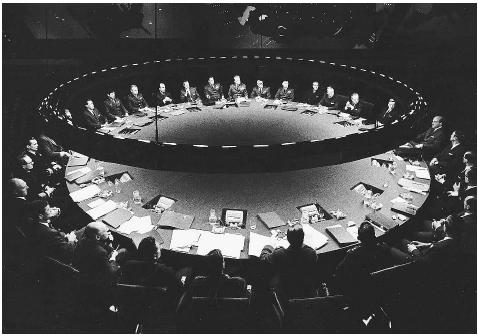RENEE MONTAGNE, host:
Osama bin Laden's death has put more pressure on the U.S.'s strategic partnership with Pakistan and its ongoing commitment to the war in Afghanistan. Our next guest believes those relationships aren't worth all the effort.
Thomas P.M. Barnett is chief analyst of Wikistrat, an online community for global strategists. He recently wrote in World Politics Review that the U.S. engagement in Afghanistan - and I'm quoting the article here - encourages enmities far more important than that of al-Qaida and denies us partnerships far more important than that of Pakistan. And he joined us to talk about that.
Good morning.
Mr. THOMAS BARNETT (Wikistrat): Good morning.
MONTAGNE: When you speak about missing out on partnerships, what precise partnerships is the U.S. missing out on there?
Mr. BARNETT: Well, the United States' pursuit of success in Afghanistan has been by my definition amazingly unilateralist. And we really haven't gone the path of encouraging regional neighbors to step in and become the great nation builders in this effort. We want to somehow make Afghanistan work, somehow integrate it with the global economy, while not letting the Iranians in on the process at all, while not letting the Indians in on the process at all, and while really trying to hedge against rising Russian or Chinese influence in the region. And that's just highly unrealistic. In geostrategic terms, it doesn't really get any dumber than that.
MONTAGNE: Well, though, you argue in your writing that Afghanistan's neighbors are highly, as you put it, highly incentivized to see Afghanistan stabilized. But in recent history, to accomplish that stability Afghanistan's neighbors have invaded - in the case of the Soviets - or backed a repressive government -as Pakistan did with the Taliban. I mean, that does not seem a very desirable outcome.
Mr. BARNETT: You have a huge market in India and a huge market in China. They want access northward and westward through Afghanistan to energy sources. Then you have major players on the other side of that equation - Russia, Turkey, Iran, so on, that want access to that major markets. And in the middle you have this dead zone called Afghanistan.
So it's a natural situation for network building. It hasn't been up to now, primarily because it's next door neighbor, Pakistan, using a rather antiquated mode of thinking looks at Afghanistan as its strategic depth in a conventional or even nuclear conflict with India to its south. For Pakistan to consider itself safe, it has to keep Afghanistan basically under its thumb.
And it's odd that America comes in, tries to do nation building, has all these incentivized local players that are interested in coming in and making things happen, and we pick out of that constellation of players the one player that's interested in keeping Afghanistan disconnected from the world, which is Pakistan.
MONTAGNE: China looms large in your thinking here. What does China stand to gain in the region both from Afghanistan and Pakistan?
Mr. BARNETT: Well, China has already made the largest foreign direct investment in Afghanistan's history - about $3 billion to $4 billion it's pursuing in terms of a copper mine there. So if you look at Afghanistan's mineral riches, there's the Chinese motivation to lock in access to resources.
With Pakistan, there's not so much the resource equation but the access to water equation, their logic being if they can make railroads happen down to the Port of Gwadar, which is a small kind of underutilized situation not that far from Karachi, the Chinese will have access to the waterways that connect them to their resources, their energy resources coming increasingly out of the Persian Gulf.
MONTAGNE: Where should, in your opinion, the U.S. focus its attention?
Mr. BARNETT: Well, if you project 10, 15, 20 years into the future and ask where are our resources going to be best employed in the near term to have the maximum impact, I think the argument is the Arab Spring presents more of a strategic opportunity - much more than the resources being employed today and potentially down the road in Afghanistan and Pakistan, which logically falls into the Chinese orbit and is more logically pawned off to the Chinese as a burden that they should naturally assume.
MONTAGNE: Thomas Barnett writes a weekly column for World Politics Review, an online service for foreign policy professionals.
Thanks very much.
Mr. BARNETT: Thank you.
 Saturday, June 11, 2011 at 11:46AM
Saturday, June 11, 2011 at 11:46AM  I like Mary Anastasia O'Grady in the WSJ, because she is the rare prominent columnist who works the Western Hemisphere with such diligence. She's also unstinting in a lot of good ways, so when she writes approvingly of a recent blue-ribbon commission (George Shultz, Paul Volcker, Javier Solana, etc) issuing yet another call to end the war on drugs, I listen.
I like Mary Anastasia O'Grady in the WSJ, because she is the rare prominent columnist who works the Western Hemisphere with such diligence. She's also unstinting in a lot of good ways, so when she writes approvingly of a recent blue-ribbon commission (George Shultz, Paul Volcker, Javier Solana, etc) issuing yet another call to end the war on drugs, I listen.

























